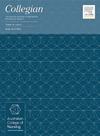Evaluating a community nursing education program to support patients during chemotherapy treatment
IF 1.7
4区 医学
Q2 NURSING
引用次数: 0
Abstract
Background
Patients receiving chemotherapy for cancer treatment frequently experience side effects such as nausea, vomiting, and diarrhoea, which negatively impact their quality of life and survival outcomes. In this study, an education program was delivered to community nurses (CNs), who subsequently provided home-based side effect management support to patients receiving chemotherapy.
Aim
This study aimed to evaluate the education program designed to enhance CNs’ knowledge of and confidence in providing chemotherapy side effect management support.
Methods
This mixed-method study used surveys and interviews. The evaluation of program content and its delivery was reported using descriptive statistics. The pre- and post-education confidence levels were compared using a paired sample t-test. Interviews explored CNs’ perspectives on the program’s adequacy and appropriateness in building their knowledge and confidence in providing chemotherapy side effect management support.
Findings
Sixty-five CNs completed the surveys. Overall, 69% (n = 45) rated the education program as either ‘excellent’ or ‘very good’. A statistically significant improvement was found in mean item confidence from pre- (3.24, SD 0.72) to post-education (4.11, SD 0.42, P < 0.001). Two focus groups and seven individual interviews were conducted, involving a total of 17 CNs. Qualitative content analysis revealed two themes: (i) CNs’ opinions on the program content and its mode of delivery, and (ii) CNs’ opinions on the adequacy of the education program in building their knowledge and confidence in chemotherapy side effect management.
Conclusion
This study demonstrated the acceptability and feasibility of delivering an education program to enhance CNs’ knowledge and confidence in supporting patients undergoing chemotherapy.
评估社区护理教育计划,以支持化疗期间的病人
背景:接受化疗治疗的癌症患者经常会出现恶心、呕吐和腹泻等副作用,这些副作用会对他们的生活质量和生存结果产生负面影响。在本研究中,向社区护士(CNs)提供了一个教育计划,他们随后为接受化疗的患者提供以家庭为基础的副作用管理支持。目的本研究旨在评估旨在提高cnns提供化疗副作用管理支持的知识和信心的教育方案。方法采用问卷调查和访谈相结合的方法。对项目内容及其交付的评估使用描述性统计进行报告。使用配对样本t检验比较教育前和教育后的置信水平。采访探讨了cnn对该项目的充分性和适当性的看法,以建立他们在提供化疗副作用管理支持方面的知识和信心。65家cnn完成了调查。总体而言,69% (n = 45)的受访者将教育项目评为“优秀”或“非常好”。平均项目置信度从教育前(3.24,SD 0.72)到教育后(4.11,SD 0.42, P <;0.001)。共进行了2个焦点小组和7个个人访谈,共涉及17名cnn。定性内容分析揭示了两个主题:(i) CNs对课程内容及其交付方式的意见;(ii) CNs对教育课程是否足够建立他们对化疗副作用管理的知识和信心的意见。结论本研究证明了提供教育计划以提高中枢神经系统护士支持化疗患者的知识和信心的可接受性和可行性。
本文章由计算机程序翻译,如有差异,请以英文原文为准。
求助全文
约1分钟内获得全文
求助全文
来源期刊

Collegian
NURSING-
CiteScore
2.70
自引率
6.70%
发文量
127
审稿时长
72 days
期刊介绍:
Collegian: The Australian Journal of Nursing Practice, Scholarship and Research is the official journal of Australian College of Nursing (ACN).
The journal aims to reflect the broad interests of nurses and the nursing profession, and to challenge nurses on emerging areas of interest. It publishes research articles and scholarly discussion of nursing practice, policy and professional issues.
Papers published in the journal are peer reviewed by a double blind process using reviewers who meet high standards of academic and clinical expertise. Invited papers that contribute to nursing knowledge and debate are published at the discretion of the Editor.
The journal, online only from 2016, is available to members of ACN and also by separate subscription.
ACN believes that each and every nurse in Australia should have the opportunity to grow their career through quality education, and further our profession through representation. ACN is the voice of influence, providing the nursing expertise and experience required when government and key stakeholders are deciding the future of health.
 求助内容:
求助内容: 应助结果提醒方式:
应助结果提醒方式:


